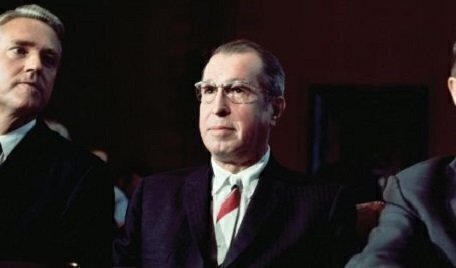On November 21, 1969, a divided Senate refused to confirm Clement Haynsworth, President Richard Nixon’s first replacement for Supreme Court Justice Abe Fortas, with some Republicans opposing their own President's nominee.
 The fight over Fortas, his failed Chief Justice nomination, and the failure of three Fortas replacements involved two presidential administrations and two Senates over a 22-month period.
The fight over Fortas, his failed Chief Justice nomination, and the failure of three Fortas replacements involved two presidential administrations and two Senates over a 22-month period.
The Senate easily confirmed Fortas, a friend of President Lyndon Johnson's, in a voice vote in 1965. But three years later, Johnson’s nomination of Fortas to replace Earl Warren as Chief Justice was filibustered by southern Democrats and Republicans in the Senate.
The move to oppose Fortas’ elevation to Chief Justice started in June 1968 with the process that led to a failed cloture vote. At the same time, President Johnson nominated Homer Thornberry, a federal judge (and Johnson confidant) to take the Associate Justice seat Fortas would vacate on his elevation to Chief Justice. When the Fortas Chief Justice nomination failed in October 1968, Thornberry’s chance to join the Court also disappeared.
Fortas remained on the Court into May 1969 amid allegations he had taken legal payments for speaking engagements that represented a conflict of interest and then had kept a legal retainer fee for a financier who faced investigations.
The following month, Warren Burger, Nixon’s nominee as Chief Justice, won an easy confirmation in a 74-3 vote. And in August 1969, Nixon nominated Haynsworth, a long-time federal judge from South Carolina, to fill the Fortas seat on the bench. It was believed President Nixon wanted a southern nominee to bolster the Republican presence in the South and to add another judicial conservative to the Court in addition to Burger.
Haynsworth had joined the U.S. Court of Appeals for the Fourth Circuit in 1957 and had a considerable record of writing opinions as the court’s chief judge since 1964, including opinions about civil rights cases. But Haynsworth’s nomination was troubled from the start, as some Democrats recalled the stalled Fortas elevation process. The Democrats also controlled the Senate and the Haynsworth nomination was opposed by organized labor and civil rights groups.
And like Thurgood Marshall’s 1967 confirmation hearing, the Haynsworth hearings in 1969 also had extended questions and comments from the Senate Judiciary Committee, which was unusual for the time. One issue that was debated was Haynsworth’s ownership of stock investments in three companies that were involved in appeals court decisions in which he took part. But even Haynsworth’s critics said the judge didn’t profit from the decisions and his nomination was supported by the American Bar Association.
In a 45-55 vote, the Senate refused to confirm Haynsworth’s nomination, with 17 Republicans joining Democrats in the No vote. Contemporary news reports cited the similarity of conflict-of-interest concerns between the Fortas and Haynsworth nominations as leading some Republicans to decline the President’s nominee.
Nixon’s next nominee to replace Fortas, Harold Carswell, fared little better. Carswell faced scrutiny for civil rights statements while he was a political candidate in Georgia, including remarks supporting white supremacy. Like Haynsworth, Carswell got a Senate nomination vote and failed in a 45-51 vote. Nixon then nominated Harry A. Blackmun, who had been recommended by Chief Justice Burger, as Fortas’ replacement in April 1970 and within a month, Blackmun had been confirmed.
Haynsworth served on the federal bench full time until 1981 and as a senior judge until his death in 1989. After hearing of Haynsworth’s passing, Chief Justice Burger called him "one of the outstanding judges in this country. It was a great loss when he was not confirmed to the Supreme Court."







